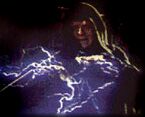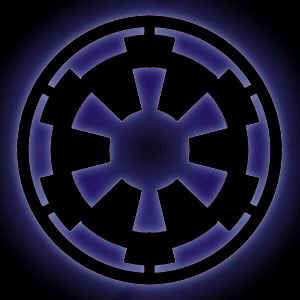
|
|
 |
IMPERIAL |
| It was
called the Old Republic. No other name was necessary. No recorded memo of the Old
Republic's inception existed, n was any needed. Its founders had faded into the dust of
history, so long ago had they lived. They had built the only galactic Community ever
known, a community that had always served its citizenry well and faithfully. N worlds came
to share in its beneficial guidance as the centuries passed. First hundreds, then
thousands, then millions of worlds banded together under its banner. For more than a
thousand generations, the worlds of civilized space co-existed within the Old Republic, a
free and equitable governmental fabric which bound its worlds and its citizens into a
beneficial whole. The common rule by the Senate served the people wisely and well.
Planets, which found themselves in jeopardy due to natural disaster or rebellious
uprising, could turn to their neighbors for help. All races, all sentient species, all
peoples were equal under the law and lived their lives with rights that ,Guaranteed both
opportunity and freedom. The guardians of this Republic were the -jedi Knights, a bold and
fearless Order that, numbering in the hundreds of thousands, ,served to defend and protect
the people of the Republic. Their wisdom, bravery and strength had become legend. The mere
mention of their intervention was often sufficient to quiet planetary lawlessness,
wherever it occurred. Drawing their common strength from the Force, the jedi maintained
peace throughout the galaxy for Generation upon generation, and passed their ways along to
those who had proven themselves both capable and worthy of Knighthood. By banding
together, the Old Republic had i-nade itself impervious to any outside attack. No other
known galactic powers dared move against them, for to do so meant certain failure. Fhe
people of the Old Republic slept securely in their beds, safe within their political
walls. Attack did come, however. But, as with many democratic societies, it came not by
outside force, but from within. Decay finally set in as more and more worlds joined the
Old Republic. |
 |
Local officials
became susceptible to influence and bribery, bowing most often to the wishes of those
involved in the dealings of interstellar commerce. The Senate, weakened by so many
centuries of peace and complacency, became dangerously careless |
Political overthrow was
unthinkable, but inevitable. An ambitious and unscrupulous senator named Palpatine rose
quickly and geometrically to power, at 'ded by those in the lower regions of the Senate
who began to crave more power and @iuthority for themselves. Promising to clean up rhe
galaxy and return the Republic to the excitei,nent of its more viral and ambitious days,
I)alpatine was elected President of the Republic, @ind surrounded himself with these
greedy and I)ower-hungry officials, who had swept him into power. What they did not know
was that Palpatine drew his power and charisma from the dark side of the Force. He had far
greater ambitions than the mere office of President would allow him, and those who had
ridden his coattails onto the upper places of political power were soon to find themselves
left behind, imprisoned, or crushed beneath the heavy hand of Palpatine as he ruthlessly
sought his ulti mate goal. Under Palpatine's orders, the new Empire began a military
buildup unlike any in recorded galactic history. Immense vessels with incredible firepower
sprang from the drawing boards and into existence seemingly overnight. The resulting
technological boom brought about the creation of a whole new science of war. The core
systems were the first to fall. Their planetary governments were forcibly disbanded as
martial law swept from world to world. Secure in his position, surrounded by a military
core that feared him, Palpatine declared himself Emperor. For the first time III uncounted
centuries, the worlds of the Old Republic found themselves ruled by one man. All personal
rights became subject to the whims of the Emperor, and early uprisings against Palpatine
were wiped out almost before thev began. In the end, there was only the Emperor iiid
through him the galaxy was ruled by the (lirk side of the Force. The Jedi were
systematically hunted doin and summarily executed. The Jedi fotiiid themselves being
abandoned, betrayed and @cti murdered by those whom they had protected for so long. But
the Force, of course, was quite recaland the black tentacles of its dark side liad
hardened Palpatinc and his new pupil, Daith Vader, into evil incarnate. They shared its
lit)r'ble energies, and used them to fill the m'iid,@ ri I I of their subservient military
minions with fcii-. Master and disciple, they ultimately de\ isell a program that should
have spelled final dooii,. for the Old Republic, The puppet Senate tli@i@ had been kept in
place was permanently (iishanded, and direct rule was given to those icgional governors
appointed by Palpatine. 'I-liL creation of a terrible weapon, one capable @l, destroying
an entire planet with a single blast, kept the terrified leaders of each world in line
under pain of annihilation. This Death Star was Palpatine's last word-the final assurance
of his stranglehold over the billions that he ruled. For all his power, however, Palpatine
had underestimated the spirit of independence still alive within the galaxy. Amid the
darkness of the oppression that held the former worlds of the Republic in its terrible
grip, there flickereda tiny ember of resistance. Fanned by the dream of regained
freedom-and by the reemergence of the virtuous side of the Force-the spark became a flame.
Despite overwhelming odds, against a seemingly invincible Imperial militan force, the
flame burst into a fire that quickl@ became brighter, hotter and purer. The Rebel Alliance
was born. The jcdl breathed again. The days of Palpatine's Empire were numbered.
 |
|
|

|
| Babe of
the Week |
|

